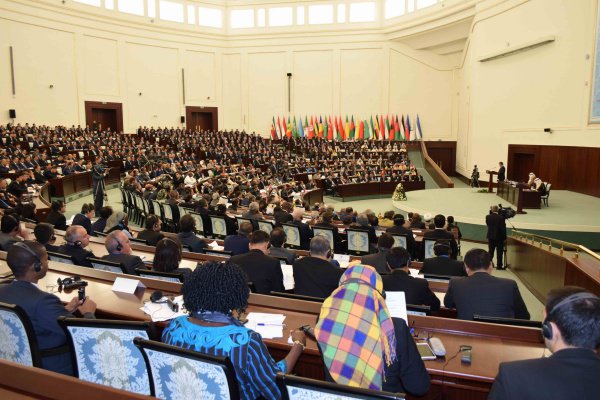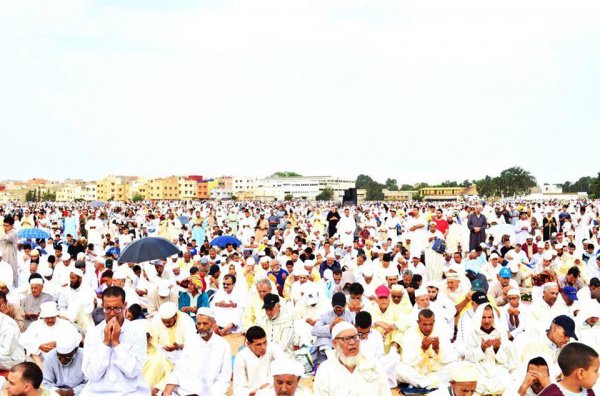This year marks the 50th anniversary of the foundation of the Organization of Islamic Cooperation. Within these years, the interaction between the Islamic world and other states has increased and there has begun a new stage of relations. Let us remember how it all began, who was at the origins of the Organization of Islamic Conference at that time, what were the objectives and tasks and what changes in structure and functioning of the organization should be expected.
The origins of the Organization of Islamic Cooperation
At the moment of its establishment, the Organization of Islamic Cooperation was called the Organization of Islamic Conference.
The Organization of Islamic Conference differed from other international inter-political organizations that it emerged as a legally formalized political mechanism of cooperation and consolidation between states on the basis of religion.
The roots of this organization lead to the time of the Second World War. The biggest military confrontation in the history of mankind marked the end of pan-Islamism, the main goal of which was to revive the Islamic Caliphate. At that moment the Islamic world moved to a new stage of its political life.
The political and international transformations of that period, especially the defeat of the Arabs in the war of the year 1948, the formation of the Israeli regime in the lands of Palestine, the establishment of the Islamic Republic of Pakistan in the Muslim-populated part of India, the adoption of nationalism as an ideology and political force, as well as the fight against colonialism and the consequent liberation and sovereignty of colonies had a significant impact on the political views in the Muslim countries. Those events caused the formation of a relatively unified front among the states with prevailed Muslim population in the world.
Thus, in the beginning of the second half of the XX century, the heads of such states began to highlight the necessity to create an organization, which would help to establish the single community in order to replace divisions, disagreements and strife with unity, cohesion and solidarity. Numerous conferences in a number of countries, including the first and the second Mecca Summits (1924 and 1926), the Cairo Conference (1926), the Quds Conference (1931), the Geneva Conference (1935), the Inter-Parliamentary Congress of Arab and Muslim Countries for the Defense of Palestine in October of the year 1938, as well as consecutive meetings after the Second World War showed that Muslim countries were determined to create an international organization on the basis of their own religion.
President of Egypt Gamal Abdel Nasser was the first who proposed the idea of creating an international organization of Muslim states in 1956, but at that moment it was not implemented. A powerful impetus for creating the Organization of Islamic Conference (nowadays – the Organization of Islamic Cooperation) was the arson of the Al-Aqsa Mosque in 1969. It caused strong discontent among Muslims around the world. The Israeli regime blamed the Australian tourist. Then the Israeli court admitted that the Australian was deranged at the moment of the arson and, according to the laws of the Zionist regime, found him innocent.
Saudi Arabia and Morocco at that time made much effort in order to hold a meeting and to investigate that crime. In a month, in September of the year 1969, the representatives of 12 Asian, 11 African Muslim states and Palestine gathered in Rabat, the capital of Morocco. There were three issues on the agenda: the arson of the Al-Aqsa Mosque, the occupation of Arab areas by Israel and the situation in Quds (Jerusalem). Later, that meeting was called the First Islamic Summit Conference. The Organization of Islamic Cooperation has existed exactly since that time.
At the first meeting of Ministers for Foreign Affairs in March of the year 1970, there was approved the establishment of the permanent presidium. The city of Jeddah was temporarily chosen as the headquarters of that presidium, pending the release of Quds.
The second meeting of Ministers for Foreign Affairs was held in the Pakistani city of Karachi, where the Prime Minister of Malaysia was elected the Secretary General. He was tasked with drafting the charter of the Organization of Islamic Conference and transmitting it to the next meeting. At the next meeting in Jeddah on March 24 of the year 1972, the Organization of Islamic Conference was officially formed by the adoption of the charter.

To defend the interests of the Islamic world
The Organization of Islamic Cooperation is the second largest inter-governmental organization in the world after the UN in terms of the number of member-states. It comprises 57 member states.
The original statue had the following objectives:
1. Strengthening Islamic solidarity among the member countries.
2. Support of mutual cooperation between member countries in economic, cultural, scientific and other important spheres and consultations with member countries of international organizations.
3. Elimination of racial discrimination and colonialism with the help of various means.
4. Taking necessary measures to maintain peace based on justice.
5. Coordinated work of the Organization of Islamic Cooperation to preserve peace in holy temples, liberate them, support the struggle of the Palestinian people and assist them in restoring their rights and liberating the occupied lands.
6. Supporting the struggle of all the Muslim peoples to protect and preserve their essence, sovereignty and national rights.
7. Preparation of an enabling environment for increased understanding between member countries and other countries.
The Islamic member countries, having adopted the aforementioned objectives, agreed on five principles:
1. Equality must prevail among the member countries of the Organization. This principle means that political and economic discrimination among member countries is unacceptable. It could manifest itself, for example, in the unequal number of votes of different countries.
2. All the member countries must respect the principle of freedom of self-determination and must not interfere in each other’s internal affairs.
3. The member countries must respect each other’s sovereignty, independence and territorial integrity.
4. They must resolve any dispute by peaceful means – negotiations, mediation or arbitration.
5. They must not use force or threats against each other’s unity, territorial sovereignty or political independence.
The governing bodies of the Organization of Islamic Cooperation: Summit (meeting of kings, heads of states and governments), conference of Ministers for Foreign Affairs, General Secretariat and subsidiary bodies (Article 3 of the Charter of the Organization of Islamic Conference). They determine the main policy of Muslim states. Such meetings are held every three years. The Conference of Ministers for Foreign Affairs is held annually. Extraordinary conferences can be held if there is a necessity.
The Organization of Islamic Cooperation has a number of independent organizations established according to its conferences and the activities of which are coordinated by the General Secretariat: the Islamic Development Bank, the Islamic News Agency, the Islamic States Broadcasting Organization, Islamic Economic and Cultural Commission, Islamic Centre for Vocational Training and Research, the Research Centre for Islamic History, Art and Culture, the Jerusalem Fund, the Committee for Jerusalem, the Islamic Chamber of Commerce and Industry, the Organization of Islamic Capitals and Cities, the Statistical, Economic and Social Research and Training Centre for Islamic Countries, the Committee of Islamic Solidarity with the Muslim African countries of Sahel, the Islamic Shipowners Association, the Islamic Centre for the Development of Trade, the Islamic Development Fund, the Islamic Educational, Scientific and Cultural Organization. The establishment of the Islamic International Court of Justice is under way.

Conferences of the heads of states and governments, which are convened every three years, play the main role in the activities of the Organization of Islamic Cooperation. Conferences of Ministers for Foreign Affairs are convened at intervals of one year. Both general issues of the civilizational development of Islam and some specific ways of interaction between Muslim countries on international issues of their concerns are discussed at these meetings. In the framework of the Organization of Muslim Cooperation, a number of permanent committees formally chaired by the heads of separate states have been established.
More important is the role of the Organization of Islamic Cooperation in determining the general approach to some international political issues affecting the Muslim world, such as Palestinian, Afghan or Bosnian ones. The Organization of Islamic Cooperation has also addressed the end of the Iran-Iraq war and the Tajik settlement. It is remarkable that the entry of some post-soviet republics with the Muslim population into the Organization of Islamic Cooperation (Azerbaijan, Uzbekistan, Kyrgyzstan, Tajikistan, Turkmenistan), which are associated with the accession to this structure of hope for expanding their foreign policy opportunities. In 2005, the Russian Federation joined the Organization as an observer.
Photo: the OIC flickr-account
The Group of Strategic Vision "Russia - Islamic World"
